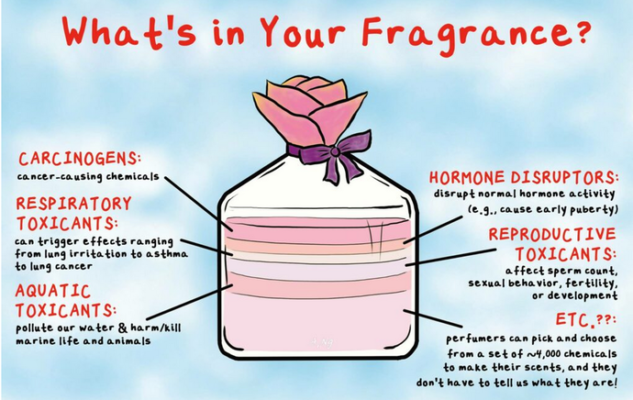Health & Wellness, Ingredients Matter
Fragrances To Die For
I was selling at a boutique over Valentine’s weekend and was next to a direct marketi ng company that sells diffusers with fragrances embedded into wood like nuggets. You may know who they are. I overheard the representative say, “there are no chemicals in our fragrances”. Huh? No chemicals? If there are no chemicals, what’s in it? Everything is a chemical. Water is a chemical, air is a chemical. Then she went on to say we only use “natural fragrances”. What? There is no such thing as natural fragrances. In addition, there is no standardized criteria defining a natural fragrance. They are all derived synthetically. It’s true, there are naturally derived fragrances, but those start with an isolated sterol or ingredient from a plant, and from there, other chemicals (synthetic and natural) are added to create the desired end fragrance. So, naturally derived fragrances, is still not the whole scent, as you get with essential oils.
ng company that sells diffusers with fragrances embedded into wood like nuggets. You may know who they are. I overheard the representative say, “there are no chemicals in our fragrances”. Huh? No chemicals? If there are no chemicals, what’s in it? Everything is a chemical. Water is a chemical, air is a chemical. Then she went on to say we only use “natural fragrances”. What? There is no such thing as natural fragrances. In addition, there is no standardized criteria defining a natural fragrance. They are all derived synthetically. It’s true, there are naturally derived fragrances, but those start with an isolated sterol or ingredient from a plant, and from there, other chemicals (synthetic and natural) are added to create the desired end fragrance. So, naturally derived fragrances, is still not the whole scent, as you get with essential oils.
On countless occasions you have heard me tout essential oils over fragrance oils. Aside from having scent, they provide a physiological and psychological effect on the human system. Fragrance oils on the other hand, might stimulate a memory from childhood, but fragrance oils are riddled with toxic chemicals that can cause harm.
I know what you’re thinking. How is this possible? How would our government allow this to be? It’s because in the U.S., fragrances do not have to identify their list of ingredients because they are considered “trade secrets”. It is “legal” for a company to utilize terms like “fragrance” and “proprietary blend” to get away with using thousands of ingredients they do not have to have verified for safety. If a scent has been added to a product, it just has to say fragrance. Even though everything else in the product (greater than 0.5 percent) has to be stated on the label. And there are more than 3000 chemicals used to create fragrances. What we do know is that they are essentially a chemical cocktail of harmful, anonymous substances including everything from carcinogens, allergens, respiratory irritants, endocrine disruptors, neurotoxic chemicals and environmental toxicants derived from petroleum oil. Toxic ingredients to create fragrances to die for, or at least cause harm.
To make matters worse, the most toxic substances of all happen to be hidden in the most commonly used products such as body and face lotions, shampoos, perfume and cologne, candles, soaps and laundry detergent, and many other common household products. These poisonous fragrances are known endocrine disruptors, which disturb the delicate balance of your entire system. The endocrine system is made up of glands that secrete enzymes and hormones to keep the body calibrated and in balance. When it’s disrupted, a cascade of diseases can manifest, including obesity, diabetes, cancer, and more.
I’m going to discuss the top three chemical ingredients found in fragrance oils. Phthalates, benzoprolene, and styrene.
Phthalates (pronounced tha-layt) are a family of man-made chemical compounds developed in the last century to be used in the manufacture of plastics, solvents, and personal care products. The ever-present use of phthalates as an additive to PVC (polyvinyl chloride) products to make them flexible and to personal care products to make fragrances last longer in the past 50 years has resulted in widespread general population exposure. Phthalates must be listed among the ingredients on product labels, unless they are added as a part of the “fragrance.” Then they don’t. Even though they may make up 20% or more of the fragrance.
Recent studies in human populations confirm the adverse impacts of phthalates on male reproductive tract development first identified in many experimental animal studies. A systematic review also finds that higher exposures are associated with sperm abnormalities and lower testosterone levels.
Recent studies also show that prenatal (while the woman is pregnant) exposure to phthalates is associated with adverse impacts on neurodevelopment, including lower IQ, and problems with attention and hyperactivity, and poorer social communication.
In personal care products, benzophenone (pronounced ben-zo-fee-nown), and it’s derivatives, is used as a fragrance enhancer or to prevent personal care products such as soaps from losing scents and colors in the presence of UV light. Its presence in food products and food packaging is banned in the United States as its a known carcinogen. However, it’s still allowed use in personal care products such as sun screen, anti-aging creams, moisturizers, and fragrances. It has been shown to absorb through the skin, as revealed by urine samples.
Styrene is a flammable liquid that’s used to make polystyrene plastics, fiberglass, rubber, and latex. In 2011, it was declared an ‘anticipated human carcinogen’ by the National Toxicology Program and the National Academy of Science. With long term exposure, styrene is known to cause central nervous system and kidney effects, headaches, depression, fatigue & weakness, hearing loss, balance & concentration problems, and cancer. It’s use was banned in 2018 as food flavoring additive because of it’s a known carcinogen, but is still allowed use in fragrances, in spite of all the known toxicity effects. Its slightly sweet odor evaporates easily, making it desirable to use in fragrance oils.
You can’t find any of these ingredients on a personal care product label if its part of the fragrance for reasons stated above. And therein lies the danger. Again, I stress the importance of moving away from synthetic fragrances to essential oils.
Final thoughts
When you compare the risks of synthetics to the cost and time of healthier alternatives, there’s really no logical reason to continue the use of toxic synthetics. Typically, the primary reason people continue to buy cheap products containing these harsh ingredients is due to money and convenience. However, a single bottle of essential oil can make countless products when paired with a few bulk ingredients like coconut oil, apple cider vinegar or just water. What’s more, essential oils come in a large variety of incredible scents and have additional therapeutic benefits. So why not give it a try?
As you move away from synthetic scents you’ll find yourself returning to a normal state where synthetic scents will smell like bad chemicals. This is how it should be. You can’t tell me that the outdoor freshness on a box of bounce dryer sheets ever smelt like that! Just walking through a park or the outdoors will tell you that.
At Soap Essential, we love essential oils. They are more expensive than fragrance oils but worth their investment, and a bargain for the benefits they provide. Peruse our soaps, serums, and face creams for a variety of different scents. And when we say unscented, we mean unscented. It’s not masked with something to hide odors.
Share a friendly knowledge nugget with a stranger, a friend, a family member. Be kind and show love. It pays itself in spades! Keep looking up and continue to rise, reach, and become! It’s the best of you that will change the world, one person at a time.
Forever Your Champion,
Samantha

